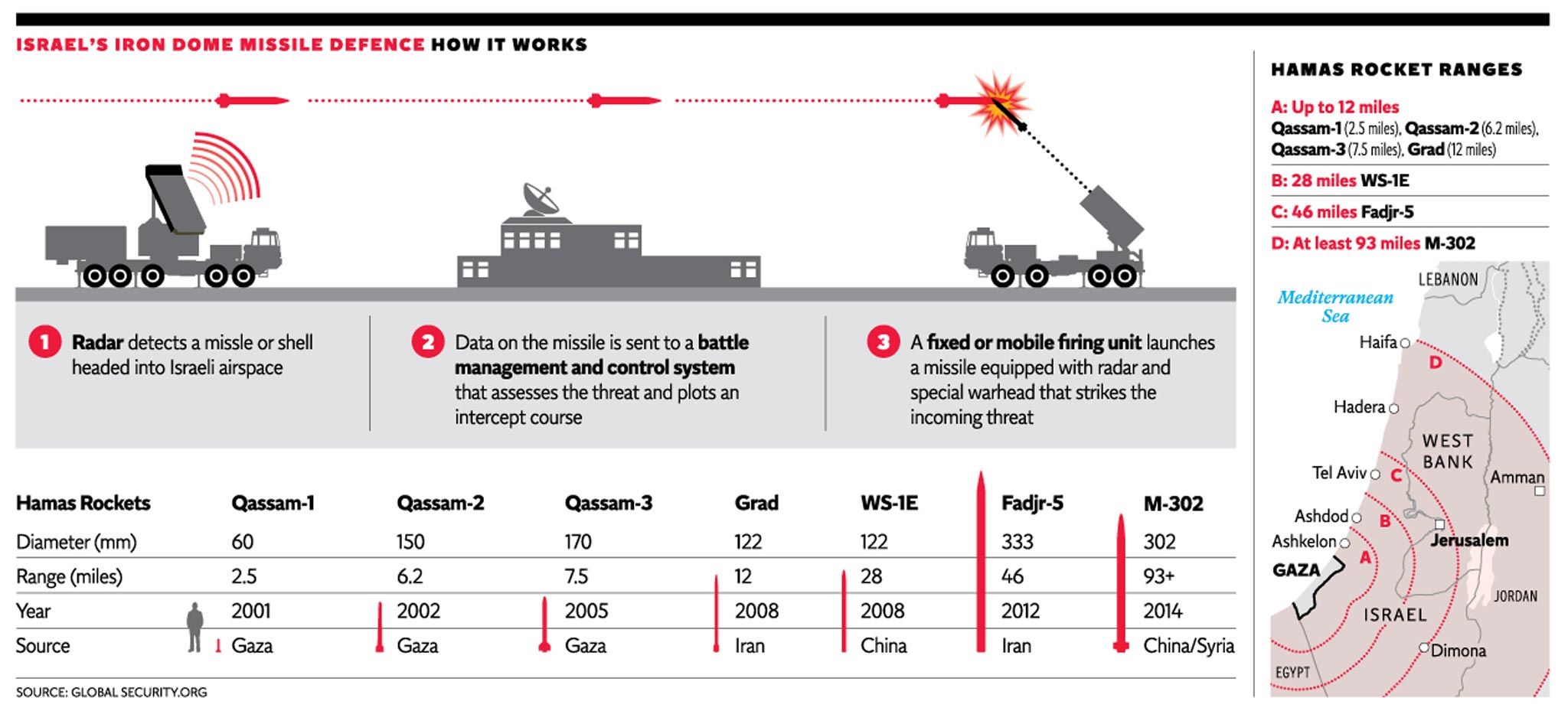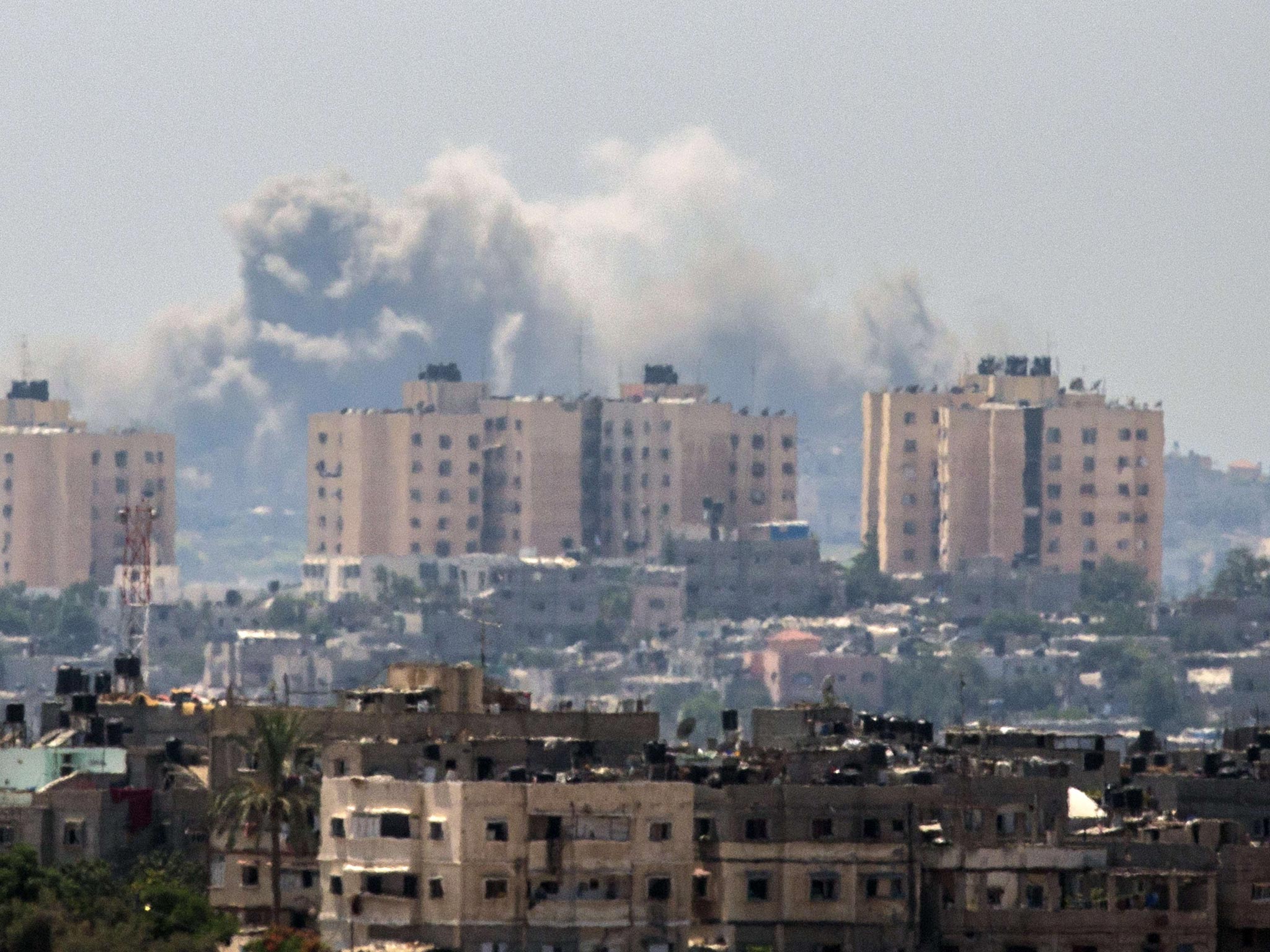Israel-Gaza crisis: Benjamin Netanyahu rules out ceasefire despite growing death toll from air strikes
About four hundred people have been injured in Israeli attacks, including 123 children, according to al-Mezan

A family of eight, as well as nine football fans watching the World Cup, were among the victims of Thursday’s Israeli air strikes on the Gaza Strip, as Benjamin Netanyahu vowed there would be no ceasefire.
The Israeli PM said air strikes would continue despite the mounting death toll. “I am not speaking with anyone about a ceasefire. That is not under consideration,” he said.
The deadliest Israeli strike killed eight members of the al-Haj family in Khan Yunis refugee camp in the southern part of the Strip. Mahmoud al-Haj, 57, died along with his wife Basma, three sons and three daughters. Twenty-three people were injured. Late on Wednesday, the Israeli air force struck a beach café in Khan Yunis, where dozens of Palestinians were watching the World Cup. Nine people died.
According to the al-Mezan human rights group, more than 76 Palestinians, including 20 children and 10 women have died since Israel launched Operation Protective Edge on Tuesday with the stated aims of halting Hamas-led rocket fire from Gaza to Israel and hitting the Islamist group hard.
Hamas kept up its rocket barrages, targetting Tel Aviv and Jerusalem in addition to southern Israel. A Hamas spokesman, Sami Abu Zuhri, said it was ready to “fight to the end”. There have been no Israeli fatalities or serious injuries in the violence.
Ban Ki-moon, Secretary-General of the United Nations, told an emergency meeting of the UN Security Council: “Gaza… cannot afford another full-blown war. The potential negative spillover elsewhere in the West Bank is also unpredictable in an already tenuous and combustible situation.”
He condemned Hamas and Islamic Jihad for firing more than 550 rockets and mortars into Israel, but he added that “the excessive use of force and endangering of civilian lives are also intolerable” – an apparent message to Israel. “It is unacceptable for citizens on both sides to permanently live in fear of the next aerial attack. Once again, Palestinian civilians are caught between Hamas’s irresponsibility and Israel’s tough response,” Mr Ban added.
Lt Col Peter Lerner, an Israeli army spokesman, said his preliminary information showed the attack on the Khan Yunis beach café “was not an instance of targeting premises of Hamas command and control but that... terrorists... were the target”. Palestinian reports from Beit Lahiya said a five-year-old boy was killed in an Israeli air strike.
About four hundred people have been injured in Israeli attacks, including 123 children, according to al-Mezan.
Bill Van Esveld, of Human Rights Watch, attributed the high civilian casualty rate partly to Israel’s targetting of houses belonging to militant commanders and their families. Israel says the civilian casualties are because Hamas uses non-combatants as human shields.
Moshe Yaalon, the Israeli defence minister, said: “The gains of the Israel Defence Forces until now are very substantial and we are continuing in systematic fashion with the attack on the terror groups and harming them greatly. We will continue this until they understand that escalation is not worth it and that we don’t tolerate fire on our communities and citizens.”
As Hamas continues to fire, Mr Netanyahu will have to decide whether to expand the Israeli campaign into a ground invasion of the Strip, which many of his political allies want. The army stresses that it warns inhabitants – by phone and by firing a missile without any explosives – to vacate before striking the houses. But Palestinians say in some cases no warning has been issued and some destroyed houses do not belong to militants. “If there is a policy of targeting the houses rather than targeting the militants themselves, it is very likely we will see more civilian casualties,” said Mr Van Esveld. “If there is a policy of punitively destroying people’s houses it’s got to be ended immediately. That is collective punishment: its unlawful and it causes civilian casualties.”
Lt Col Lerner said the houses are “command and control positions situated in residential areas where they make decisions and send people to make attacks. Hamas… place rocket launchers next to a car park for ambulances. They have no regard for human life, Israeli or Palestinian.”

On Thursday night a further 20 rockets were fired at the city of Beer Sheeva, damaging one house.
Gaza residents, however, say it is Israel which has no regard for human life. “The Jews say they are fighting Hamas and fighting gunmen, while all the bodies we have seen on television are women and children,” Khaled Ali, a taxi driver, told Reuters.
Security officials are satisfied with the performance of the Iron Dome aerial defence system, but the sense is that Israel’s luck will run out. One rocket landed at a petrol station in the Florentine area of south Tel Aviv early on Thursday, causing very slight damage and no casualties.
Michael Savlov, who works at the station, said: “It made a sound like a traffic accident and landed three metres away from the office, where I was. I’m lucky today. It’s as if I’ve won the lottery.”
Nearby, the City Café was full a few hours later. “We heard the crash. People went to see it and then came back to the tables,” said worker Adi Kalifa. Haya Zommer, 63, said she was reminded of previous conflicts. “I’ve seeen this over and over and it’s almost boring. I’m just sorry people get hurt on both sides,” she said.
Yaacov Amidror, the former national security adviser, told Israel Radio a ground operation could restore Israeli rule over Gaza. But, he said, this would have a price in soldiers’ lives. “Otherwise, every two or three years we will need to do another operation,” he said.
Haaretz’s military correspondent, Amos Harel, said: “The government and command staff will need to verify that this will be a limited operation, with the goal of putting precise pressure on Hamas to achieve calm and not an ambitious effort to vitiate the rule of Hamas in Gaza.”
Join our commenting forum
Join thought-provoking conversations, follow other Independent readers and see their replies
Comments
Bookmark popover
Removed from bookmarks